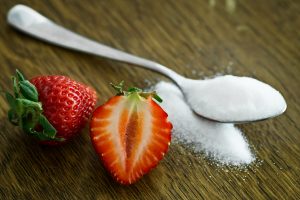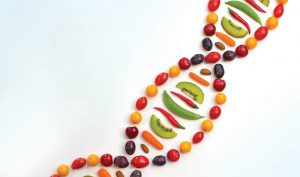A Sweet Secret
You’ve likely heard by now that we modern humans consume far too much sugar and that it’s wreaking havoc on our health. From expanding waistlines to insulin resistance and diabetes, too much of the sweet stuff is not just making us fat, it’s also making us sick. On average, Americans consume 66 pounds of added sugar per year.
I recently read that there is added sugar in 74% of packaged foods in supermarkets (source). Aside from the fact that it’s best to shop to borders at the grocery store and eat real food, if you’re going to eat from a package, it’s wise to know what’s in there.
Hidden in Plain Sight
“But I read labels”, you say.
Unfortunately, just having an awareness that sugar may be keeping you from reaching your health goals is not enough. Reading food labels is fantastic and is an excellent first step in keeping unwanted added sources of sugar out of your diet. The fewer the ingredients in a food the better. Ingredients should all be things you can pronounce and are familiar with.
Spotting added sugar can sometimes be tricky. It’s in things we consider healthy, like granola or yogurt. It’s also in savory items, such as ketchup, crackers, and bread.

Product labels are required to list total sugar, but not to specify how much of that sugar is naturally occurring, such as in sugar and milk, and how much has been added. Keep an eye out for the following sources of added sugar while scanning ingredient lists.
The many names of sugar
- Agave nectar
- Barbados sugar
- Barley malt
- Barley malt syrup
- Beet sugar
- Brown sugar
- Buttered syrup
- Cane juice
- Cane juice crystals
- Cane sugar
- Caramel
- Carob syrup
- Castor sugar
- Coconut palm sugar
- Coconut sugar
- Confectioner’s sugar
- Corn sweetener
- Corn syrup
- Corn syrup solids
- Date sugar
- Dehydrated cane juice
- Demerara sugar
- Dextrin
- Dextrose
- Evaporated cane juice
- Free-flowing brown sugars
- Fructose
- Fruit juice
- Fruit juice concentrate
- Glucose
- Glucose solids
- Golden sugar
- Golden syrup
- Grape sugar
- HFCS (High-Fructose Corn Syrup)
- Honey
- Icing sugar
- Invert sugar
- Malt syrup
- Maltodextrin
- Maltol
- Maltose
- Mannose
- Maple syrup
- Molasses
- Muscovado
- Palm sugar
- Panocha
- Powdered sugar
- Raw sugar
- Refiner’s syrup
- Rice syrup
- Saccharose
- Sorghum Syrup
- Sucrose
- Sugar (granulated)
- Sweet Sorghum
- Syrup
- Treacle
- Turbinado sugar
- Yellow sugar

